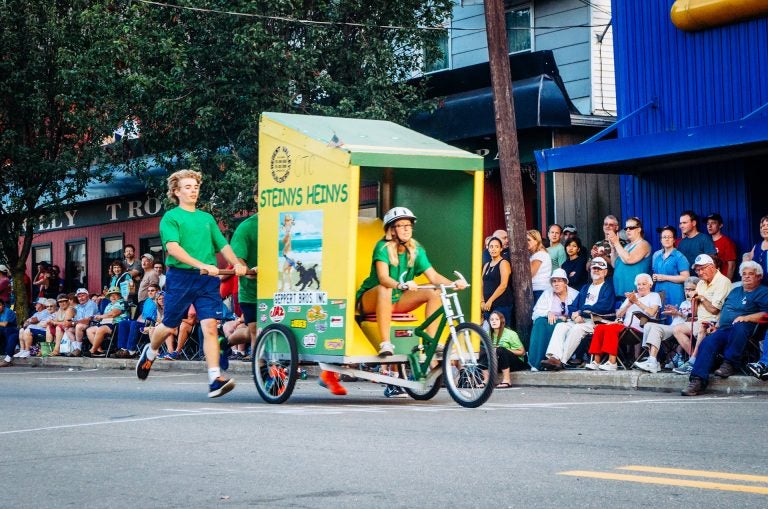In case you missed it: This week’s good reads about Pennsylvania cities

Outhouse racing in Dushore, PA (Joe Ulrich/WITF)
This week’s urban reads are brought to you by the letter “B.”
Bridge to somewhereThe Manayunk Bridge reopened to pedestrians and cyclists; a symbol of new growth and the start of a construction boom. Easier access to SEPTA may result in new ridership and less time in the car.
Despite an awareness campaign of the damage their weight can cause, “love locks” continue to thrive on Paris bridges. (The New York Times)
Breaking up is hard to doClairton wants to break free of Act 47, but residents are apprehensive. The government’s finances are improving, but there still isn’t a grocery store, unemployment is high and the town is struggling to find its post-industrial identity.
Perhaps Clairton can look to Nanticoke as a possible model on exiting Act 47. One thing both communities have learned is that freedom does come with a higher price for residents, including property tax and sewer bills.
Better Policing
Reading uses Predictive Policing software to print maps of areas where crimes are likely to occur. Using these maps, police spend more time patrolling in the areas highlighted by the software. Is this new technology a useful tool or does concentrated policing reduce crime?
Bigger PHARE fundFor the past four years, $34 million has been distributed to counties in the Marcellus Shale region through the Pennsylvania Housing Affordability and Rehabilitation Enhancement (PHARE) fund. Fees from the gas wells fund affordable housing.This month, lawmakers voted to expand the sources and eligible recipients of the funds, so that all 67 Pennsylvania counties can apply for PHARE funds.
BlightTo combat blight and crime, Philadelphia’s Doors and Windows Ordinance was enacted in 2011 and applauded by many. Considered good strategy to curb property neglect and crime, the ordinance required property owners to seal all openings with” glass windows and functional doors.” Common Pleas Court Judge Linda Carpenter’s opinion questioned the ordinance as “unduly focused on aesthetics.” (PlanPhilly)A Wilkinsburg artist battled blight with gold paint, reducing garbage and bringing attention to a gentler form of demolition and a vacant house program.
Budgets and billsImagine not being paid for four months. If you are among the fortunate, you may have savings and can take a big chunk out of your “rainy day” fund. Despite being the two wealthiest counties in Pennsylvania, Chester and Montgomery counties are underpaying vendors and using reserve funds to pay the bills. (Newsworks)
Schools are doing what they can to stay open. In Scranton, Fell Charter School will initiate a compressed schedule and starting Nov. 2, teachers will work without pay. (The Times-Tribune)
Carbondale School Superintendent Joe Gorham estimates that the district will pay between $30,000 – $50,000 on loans. Erie School District, which normally receives 70 percent of its funding from the state, considered closing schools. Instead, it is reluctantly arranging for a loan that will cost more than one hundred thousand dollars in interest. (WSKG)
Pennsylvania schools have borrowed $431 million since July and borrowing costs could reach $14 million. (WITF)
With no state funds available, the Bradford Salvation Army and YMCA are relying on the community to keep food pantries stocked. (The Bradford Era)
In Lewistown, a homeless shelter will have to start turning away new clients. (WITF)
Ballots
Three candidates are running for mayor in Reading. Democrat Wally Scott, Republican Jim McHale and Independent Frankie Graham, Jr. are on the ballot. Each has a different vision for Reading. McHale sees his real estate background as a way to revive struggling business, while Scott wants to re-focus the city’s troubled government. Graham feels that long ignored social issues need to be addressed. (WITF)
The candidates have different perspectives on improving Reading’s finances. In a recent forum, they outlined their strategy for exiting Act 47, the financial recovery program for distressed cities. (Reading Eagle)
Bootleggers and bikesBootleggers: that’s the description often used for Uber drivers by disgruntled Philly cabbies. As taxi ridership has declined and Uber continues to thrive, legislators hope to finally regulate ride-sharing. (Newsworks)
Launched on May 31, Pittsburgh’s Healthy Rides bike share program continues to log more trips, averaging 440 per day from July through September. (WESA)
Philadelphia’s Indego bike share program has been a success, but not for all. Despite having more than 7,000 monthly members, Indego has not been able to attract lower income neighborhoods. (Newsworks)
Beer and blimps
Every August the population of Dushore, Pennsylvania blooms from 500 to almost 5,000. It’s Founder’s Day and time for the annual Outhouse Races. Toilet talk is allowed and there are plenty of creative racers. Enjoy some great photos and pure revelry. (WITF)
From the Little League World Series to the Pope’s recent visit, Pennsylvania cities can handle a crowd.
Wednesday brought news of an untethered, unmanned blimp flying over Pennsylvania and tracked by fighter jets. Used to track traffic, the blimp became unmoored at the Aberdeen Proving Ground in Maryland. After knocking out power to thousands, the blimp landed near Williamsport. (The Morning Call)
Nov. 3 is Election Day. Have a great weekend.
WHYY is your source for fact-based, in-depth journalism and information. As a nonprofit organization, we rely on financial support from readers like you. Please give today.


